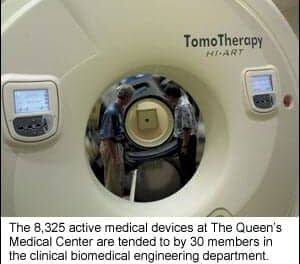By Rick Schrenker
I recently saw yet another online post regarding what I call ‘The Rodney Dangerfield Syndrome’ affecting HTM. The usual litany was more or less cited: “We don’t get any respect. People don’t know what we do until all hell breaks loose. We save the day, and nice things are said about us.” Lather, rinse, repeat.
The writer actually wrote, ‘save the day’ in his post, and I immediately thought, “Perfect!” because whenever this issue has arisen over the years, I’ve been reminded of Mighty Mouse’s famous refrain: “Here I come to save the day!” It’s deserved recognition, but if it’s always the only recognition, it’s frustrating. And it’s been frustrating for a long time.
But the problem isn’t simply how others sporadically see us—it’s also about how many of us like being seen that way, but lament the consequences without challenging our customers’ perspective.
Over 20 years ago, I wrote an article for a management column titled, “Engineers in Clinical Engineering: Does the Need Remain?” I wrote it in response to an article that argued that clinical engineering departments (as they were all called back then) should identify with the business side of the hospital. In my response, I countered that there were precious few engineers in hospitals and that our added value derived almost totally from that fact (the same can be said for BMETs). I went on to argue that one challenge of being a professional is taking a stand on something that matters—and that requires willingly disagreeing with colleagues.
To illustrate the point, I cited a passage from the book, Catch-22, in which the main character is offered a promotion. He’s been a pain in the, er, side to the brass, so he’s a bit surprised and asks what will now be expected of him. Their answer? Like them. That’s all. Like them. In other words, don’t challenge them and stop being a nuisance.
I’ve often accepted a “Mighty Mouse” compliment with something deferential like, “Thanks, but in the future consider involving us in your technology decision-making before stuff like this happens. Because not only do we know how to address emergencies like this, we also know how to avoid them in the first place.”
But I’m not always so nice. I have been known to argue that the field has to pick consequential battles and stick to them. One issue that got me particularly incensed was the name change to HTM. I mostly considered it about as consequential as the old cliché about rearranging the Titanic deck chairs. I went berserk online about it and challenged some of AAMI’s leadership who were advocating for it, and whom I held, and continue to hold, in high regard.
Over coffee at one AAMI annual meeting, I argued rather vehemently that the problem with seeing the name change as making enough of a difference to invest a lot of time and energy into it ignored the risk that it might not make a difference at all. And ignoring that risk kicked the ‘Who are we and why are we here?’ can down the road at a time when we were already beginning to see a lack of newcomers to take Boomers’ places. Time was not in the field’s favor.
So, you tell me: How much of a difference has changing the name of the field made? I’m serious—tell me; argue with me. Care enough about what the field is to define it in such a way that you’ll want to stand up for it and recruit others to the profession.
Now, to get back to where I started: Even as I approach retirement and increasingly move away from the field, I can’t help but see the downside of the Mighty Mouse syndrome cited year after year. Can I offer any suggestions? I’ll start with some more clichés to set the stage, from Einstein, who said that insanity is doing the same thing repeatedly and expecting different results and Santayana, who pointed out that those who do not learn from the past are condemned to repeat it.
If you want to be seen as anything other than a technical Mighty Mouse, then let your colleagues know it—and in no uncertain terms. Make yourself visible in other roles. Teach. Write. Present. Learn how to structure arguments to make your point, formally and informally. Broaden your department’s scope. Speak up when you see a problem. Admit when you’re wrong, but don’t back down when you’re right.
Do something different—something they don’t expect you to do, something they don’t even know you can do, and something they may not even know they need done.
Rick Schrenker is a systems engineering manager for Massachusetts General Hospital. Questions and comments can be directed to chief editor Keri Forsythe-Stephens at [email protected].







Dear Rick: Happy to see that you have changed your mind since you last commented on my similar article in June 2015 (https://24x7mag.com/2015/05/whats-in-a-name/)! Wish our community is more cohesive and willing to fight for the profession, patient safety and high quality care then constantly fighting among ourselves. Good job! Binseng
Thanks, Binseng. I’m contrarian by nature, to put it mildly, but I’ve always believed we should be able to argue amongst ourselves as well as with others. I’m never been provocative just to be provocative, but I often amp up my arguments about things I care about just to get others to respond with some passion of their own. The field needs it now as much as, if not more than, it ever has.
Great to hear from someone who can quote Mighty Mouse and George Santayana. I’ve always said that the way to be valued is to do something valuable.
And only in clinical engineering would their being mentioned in the same article make sense… (Hi, Matt)
AAMI “clarrifying” HTM in a recent blog post may illustrate how ineffective the name change has been in providing clarrity.
Point Well Taken Rick, As a Biomed my main theme is that today’s Biomeds don’t fix technology, we fix caregivers with technology problems. In a lot of ways caregivers (and their patients) with technology problems need BMETs to be their supermen. That being said, a lot of problems have two faces, the service call where we meet the caregivers immediate needs and the root cause of why the call happened. That is where it gets tough to be a BMET. in some cases, it is a simple fix or you have a call that that re occurs because the root lingers on. Finding time between service calls to address root causes to solve not just one caregivers problem, but to prevent the next call from reoccurring. This is a old familiar problem with no easy answers.
no matter what we call ourselves, caregivers still have the same needs and expectations. A technology problem comes between them and the care of their patient and Biomeds are expected to make the problem go away…
I enjoyed the article and it was spot on. Still, the problem of identity crisis persists. You can call us what you will, but when the feces hits the oscillator they know who to call, but they’ll be daggoned if they’ll call before a crisis and THEN more oft than not it will be Biomed’s fault (yes, Biomed), somehow. There used to be a story about 3 steel balls, but I can’t recall it with enough clarity to recite it. I see Biomeds’ problem as twofold.
One is lack of respect for the profession. Respect is earned and not bestowed and a name change does nothing to help acquire it. The field must police itself to earn such respect. The certification program we have today, in my humble opinion, has been watered down to where the certified tech is now what old timers would consider and entry level knowledge base. Granted, the old timers might struggle with a few of the topics today, but nothing their in depth background has not prepared them for. I remember asking a technician with a 2 year degree in Biomedical Technology to go to L&D and pick up a toco that was reported broken. She looked at me like I was a Martian with golashes on my furry bunny feet. This is NOT uncommon! Respect? Right. We need to raise the bar.
The second element I believe we need to change, and I have been harping for 30 years to no avail, we need to transform peoples’ thinking to transistion away from the COST center department to where we are a COST AVOIDANCE department. This, of course, includes prepurchase evaluations, technology consistency, technology integration, health professional and biomedical knowledge efficacy and above all else acknowledging and correcting shortfalls as soon as they are identified. Without this your program has stalled and your soaring aircraft will eventually crash.
Oh boy, a big (and old) topic.
What ever happened to the real Biomedtalk? We used to hash out some degree of consistency throughout the country right there. We DO have an identity crisis and I think it is designed by one and perhaps two or more players. BUT…. we have been the worse caretakers of our profession due to lack of cohesion. I’m sorry, but from a Biomed’s perspective AAMI means little. I hate the word Union, but I love the concept of some guiding force pulling us together. Anybody else got a better idea?
OK, I digress a bit and I am now getting off my soapbox.